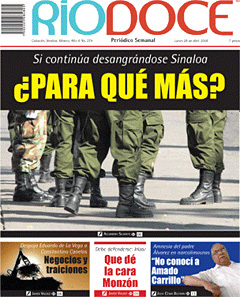
|
 |
 |
 Editorials | Issues | June 2008 Editorials | Issues | June 2008  
US House Approves Mexico Anti-Drug Aid Bill, but Mexico Balks at Senate Human Rights Conditions
 Drug War Chronicle Drug War Chronicle
go to original


| | Ríodoce (newspaper) cover - Sinaloa keeps bleeding. Why more (soldiers)? | | |
The US House of Representatives Tuesday approved a $1.6 billion, three-year anti-drug assistance plan aimed at helping Mexico and Central American countries fight the region's powerful drug trafficking organizations, but the package is now in doubt after the Mexican government voiced strong objections to provisions in the Senate version of the bill that tie the aid to human rights measures. The version of the bill in the Senate has yet to be approved.

The vote came amidst rising levels of prohibition-related violence in Mexico. Some 4,000 people - including more than 450 police and soldiers - have been killed in the drug war since President Felipe Calderon escalated it at the beginning of last year by sending some 25,000 troops and federal police into drug trafficker strongholds. The traffickers have taken time off from fighting among themselves to strike back at government forces, recently assassinating several top federal and municipal police commanders. Last week, traffickers in Culiacan ambushed and killed eight police in one day.

The bill, passed by the House 311-106, would begin to implement the Merida Initiative, named after the Mexican city where US and Mexican officials sat down last year to hammer out an assistance package. Under that plan, the US funds would go for equipping and training security forces in Mexico and Central America and for improving justice systems in the region. Mexico would get $1.1 billion, while Central American and Caribbean countries would get roughly $400 million. Another $74 million would go to trying to slow the flow of illicit weapons from the US to Mexico.

But while Mexico had been eager to win the aid package, it is balking at the conditions in the Senate bill, which include human rights reviews, judicial reforms, and other issues. The conditions mark a return to "certification," where the US unilaterally determined whether nations where complying with US drug objectives, complained Mexican assistant attorney general for international affairs Jose Luis Santiago Vasconcelos.

"Why don't we tell the Americans to use those [funds] for their own interdiction forces or interception forces... and stop the flow of weapons," Santiago Vasconcelos said in a radio interview cited by the Dallas Morning News. "Rather than giving them to Mexico, they can be used by the Americans to reinforce their Customs service, their Border Patrol, and stop the arms trafficking to our country."

Mexican Attorney General Eduardo Medina Mora said last week that President Calderon is waiting to see the final version of the bill before making a decision. "The president will very carefully consider what is finally approved, and defending the best interests of Mexico, will make the correct decision, of that we can be sure," he said.

"I think one way or another, it's dead," political commentator Ricardo Alemán told the Morning News. "Mr. Vasconcelos is a very high-ranking police official and has support from the government," Aleman said, adding that Mexican pride is at stake. "Mexicans are very unyielding on this," he said. "First you reduce the amount, and then you put on conditions, so why don't you just keep your money."

A delegation of US senators flew last weekend to Monterrey, Mexico, to meet with Mexican officials in an effort to assuage their concerns, and there are signs they will seek to remove the offensive language from the Senate bill.

"We heard from everyone here the common message that this language has got to be changed," said Sen. Chris Dodd (D-CT), one of 11 US legislators attending the two-day meeting. "Our friends in Mexico needed to vent and explain how this issue was not handled well," the senator added. "Anything that smacks of certification is a nonstarter."

Now it's time to see if the US Senate will sacrifice Mexican human rights on the altar of the drug war. | 
 | |
 |



